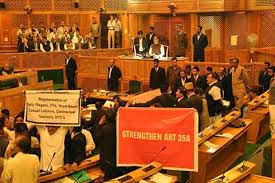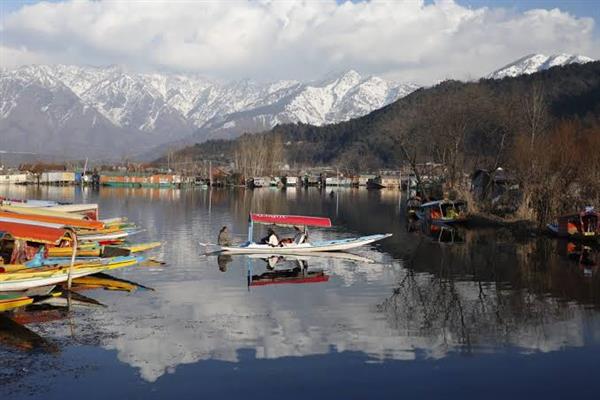The debate over Article 35A, which bestows special privileges to permanent residents of Jammu and Kashmir, is not over yet. And, it would not be over even after the Supreme Court delivers its judgment on the petition that has challenged its validity on the grounds that the Article proclaimed through Presidential Order of May 14, 1954, was issued without the mandatory approval of Parliament. Now the matter is with the court but no one is waiting for that.
On the face of it, the Opposition’s defence of Article 35A has an anti-India overtone, but it is also a cry to save this important link with mainland India and go for status quo.
Kashmiris have sought to monopolise the ownership of the said Article that grants exclusive rights to buy immovable assets, get jobs and scholarships. They have a reason; they are the biggest beneficiaries of this constitutional provision. They have expanded their footprints all across the state as also in the rest of the country.
The political, geographical, religious, ethnic and economic dimensions have made them to unite and fight for the retention of Article 35A, which has its roots in Article 370 that grants special status to J&K. They have threatened to set streets aflame out of fear of sharing all these privileges with Indians. They resist sharing these provisions even with their co-religionists from other parts of the state.
There are palpable dots of desire in the state to stay with India for all these special privileges and, ironically, there is also the fear that if this link is lost, they would head nowhere. They have made their point: don’t burn down the bridges that link them to mainland India. They are not saying it so openly and loudly but their determination and desperation to save this link says it all.
In a very simple and straight language, renowned lawyer and constitutional expert Zaffar Shah has underlined the point that this Article is a saviour of ‘Koshur’ (Kashmiri) with regard to their political and economic identity. He has told it in clear terms that Kashmiris would have to compete for jobs, scholarships, immovable assets and their distinct identity as permanent residents of the state with the residents of other parts of the country if this Article is consumed. He has given sage advice: Kashmiris should put forward their best legal defence of the Article in the Supreme Court.
What have we heard so far — that going away of this Article would impact the ultimate Kashmir solution because removal of the Article will change the demography. This is an afterthought as they wanted to deny their fight was for the benefits only.
Common Kashmiris are aware that Pakistan had killed their dream of independence when it launched the tribal invasion even after it had entered into a standstill agreement with Maharaja Hari Singh in August 1947. The agreements are signed between two sovereign nations.
And what Pakistan stands today is not hidden from them. Thousands of young men have died while the Article remains a vibrant constitutional provision, but there is no solution in sight. Kashmir wants an answer and these proponents of Kashmir solution have none.
Their inner urge is there for all to understand. Kashmiris know what suits them best, irrespective of the propaganda to the contrary.
Right now the idea of India sounds repulsive here. The extension of the mainland rules here are seen as profoundly damaging to the idea of dialogue. An overwhelming presence of troops and brazen display of hard power here have put off Kashmiris.
But the idea has the capacity to be accepted provided a fair introspection is done. This is the right time for that. Saving Kashmir is more important than doing away with an Article. The legal route is the best one, streets have never delivered justice — Kashmir has seen it all in 2008, 2010 and 2016 — when streets spoke with the ugly outcome of death, destruction and more graveyards.
Read the larger message behind saving Article 35A






